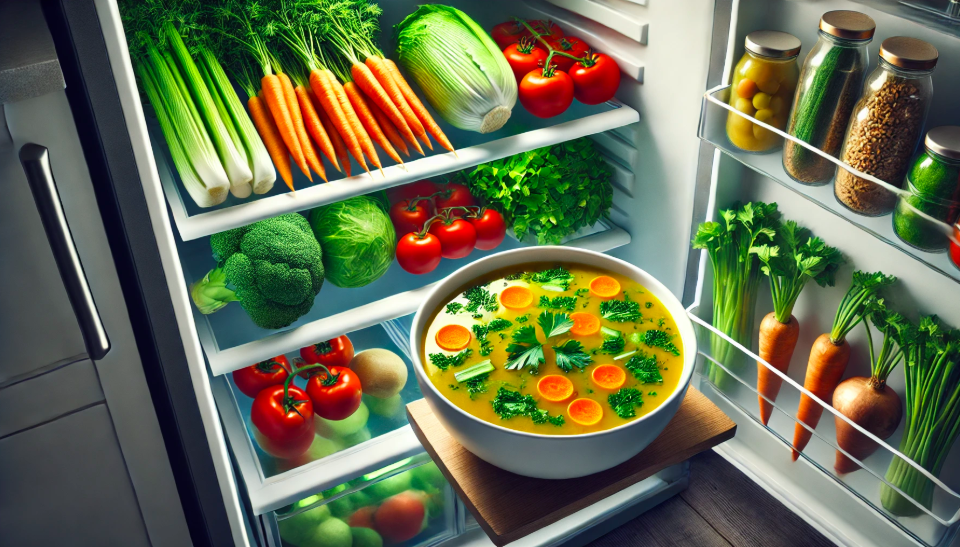
Vegetable soup can generally last 3 to 4 days in the refrigerator if stored correctly in an airtight container. The temperature of your fridge should be at or below 40°F (4°C) to keep the soup safe to eat. This timeline ensures that the soup remains safe and retains its flavor and nutritional value.
Factors That Affect The Freshness Of Vegetable Soup
- Ingredients Used: Soups with perishable ingredients like dairy, seafood, or meat spoil faster than those made with just vegetables and broth.
- Initial Cooking Temperature: If the soup wasn’t brought to a proper boil (at least 165°F or 74°C) during cooking, bacteria might survive and shorten its freshness.
- Storage Temperature: A fridge set above 40°F (4°C) accelerates bacterial growth, reducing the soup's shelf life.
- Exposure to Air: Leaving soup uncovered or stored in non-airtight containers can lead to contamination and spoilage.
- Handling Practices: Double-dipping or not washing hands before handling the soup increases the risk of bacterial contamination.
Signs Your Vegetable Soup Has Spoiled
- Unpleasant Odor: A sour or rancid smell is a clear indicator of spoilage.
- Change in Texture: A slimy or mushy texture suggests bacterial growth.
- Visible Mold: White, green, or black spots indicate fungal contamination.
- Bubbling Without Heat: Fermentation caused by bacteria can make the soup bubble, even when cold.
- Sour Taste: A sharp or unusual taste signals that the soup is no longer safe to eat.
Best Practices For Storing Vegetable Soup
- Cool Before Storing: Allow the soup to cool to room temperature before refrigerating but avoid leaving it out for more than 2 hours.
- Use Airtight Containers: Store the soup in leak-proof containers to prevent exposure to air and bacteria.
- Label and Date: Write the storage date to track how long the soup has been in the fridge.
- Store on the Right Shelf: Place the soup on the middle or lower shelf where the temperature is most stable.
- Avoid Overfilling the Container: Leave some space for expansion, especially if freezing.
Can You Freeze Vegetable Soup To Extend Its Shelf Life?
Yes, vegetable soup can be frozen to significantly extend its shelf life, lasting 2 to 3 months in the freezer. Use freezer-safe containers or resealable bags to store the soup. Ensure the soup is completely cooled before freezing to prevent ice crystals and freezer burn. Freezing preserves the texture and flavor of the soup, but soups containing potatoes or cream may slightly change in consistency upon thawing.
How To Reheat Vegetable Soup Safely
- Thaw Frozen Soup: If frozen, thaw the soup in the refrigerator overnight or use a microwave’s defrost setting.
- Use a Stove or Microwave: Heat the soup to at least 165°F (74°C) to kill any bacteria. Use a food thermometer if possible.
- Stir Frequently: Stirring ensures even heating and prevents hot spots that can harbor bacteria.
- Avoid Reheating Multiple Times: Reheat only the portion you plan to eat to maintain the soup's quality and safety.
Homemade Vs. Store-Bought Vegetable Soup: Which Lasts Longer?
- Homemade Vegetable Soup: Typically lasts 3 to 4 days in the fridge since it doesn’t contain preservatives. Its shelf life depends heavily on proper cooking, storage, and ingredients.
- Store-Bought Vegetable Soup: Can last 4 to 5 days after opening if refrigerated properly, thanks to preservatives and vacuum-sealed packaging. Unopened store-bought soup may have a shelf life of several months due to pasteurization and sealed packaging. Store-bought soup tends to last slightly longer, but homemade soup is fresher and free from added chemicals.